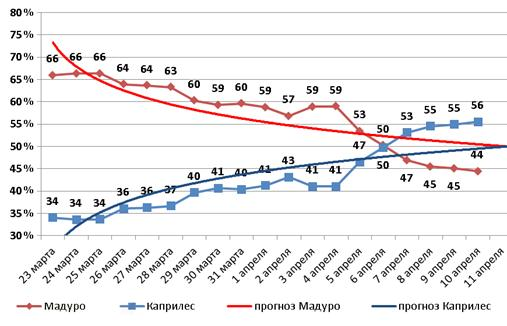Transformation of threats in the information space: from technological to social. Part II
In the first part of the article, we shared a new concept of information security, which gradually took shape in our consciousness and found “wide support in narrow circles”. The idea is as follows: humanity has entered an era of excessive informational openness, which opened the Pandora’s box of the latest threats on the Web. In the second part, we continue to discuss the real cases that characterize the modified paradigm of "INFORMATION SECURITY" of the modern world.

CASE 3: REGION / COUNTRY - PROMOTION OF IDEAS
The election campaign in Venezuela - informational attack on the leader
Venezuela, March 2013: after the death of Chavez, the presidential election is scheduled for April 14.
The two main contenders: Maduro and Capriles.
All polls of classical sociology predict the convincing victory of “Chavez's heir,” Maduro, with measurements of ~ 60/40.
For several weeks, several dozens of ideas, situations, memes, etc. were tested on the Venezuelan Internet. According to the results, 2 ideas were selected, which caused the greatest reaction of the audience. The information impact focused on them:
1. Idea: “Maduro is not Chavez,”
2. Taunts and jokes about the “prophetic” dream of Maduro (allegedly in a dream he had a white bird on his head, which was the spirit of Chavez and predicted the victory of Maduro).
')
In just 3 weeks of active election campaign, the attitude of the population towards candidates has changed from 60/40 to almost 50/50.

On the graph, “broken” lines show momentary, emotional preferences in relations with candidates, and smooth lines show expectations (forecast) of will.
The forecast is made taking into account the general information field around candidates (not only in social media) and smoothing factors (for example, by the power of influence depending on time, etc.).
To clarify the difference, a rough analogy: when we no longer like the current mobile phone, we will scold it (not) for a long time, but it will take some time before the final decision to change our preferences (buy a new one).
Monitoring and analysis of social media allows you to organize an effective defense against information attacks. Social media allows you to quickly identify changes in the situation and accurately reflect the mood of society, and a multifactor analysis of messages allows you to predict results with high accuracy:
Vox Populi Forecast (published April 11, 3 before the election):
Maduro - 50.7%, Capriles - 48.8%
Official election results, April 15:
Maduro - 50.7%, Capriles - 49.1%
Russian sociologists ( Vox Populi Foundation) predicted results based on monitoring of the situation in social media and gave the most accurate forecast, while American, Argentine, Colombian, Spanish sociological companies made a mistake by 5-7%. Classical (polling) sociology simply did not have time to react in such a short time to the dynamics of changes caused by the active information struggle in social networks.
It should be borne in mind that Venezuela - the leader in terms of growth of the Internet. Before Chavez died, there were large-scale free distributions of computers and laptops for the population, almost the whole country is covered with cheap Internet. For comparison: the activity on the Internet during the elections of Venezuelans (29 million inhabitants) 10 times (!) Exceeded the activity of the Germans during the autumn elections of the Chancellor.
1. Social networks - a great tool for rapid testing of the "contagion" of ideas, slogans, memes.
2. Social networks - the best environment for the viral dissemination of ideas.
3. Social networks - an effective way to quickly influence the fluctuating electorate.
The elections in Venezuela were interesting for us, because we had a chance to test our technologies in the most “pure” way: the country as far as possible from Russia, the minimum information about the situation, complete ignorance of the language, very tight deadlines.
PS We did not include two cases in the article at once, so the next “world” case, dedicated to a powerful information attack around the world on the planned attack on Syria, will be presented in the next article. If, of course, readers will be interested - we are trying to closely monitor the reaction to our articles.
PPS By the way, a good idea - in one of our future articles we will talk about monitoring the reaction to numerous publications in the media and online resources on our projects and studies. Positive emotions are guaranteed :)

CASE 3: REGION / COUNTRY - PROMOTION OF IDEAS
The election campaign in Venezuela - informational attack on the leader
Introductory
Venezuela, March 2013: after the death of Chavez, the presidential election is scheduled for April 14.
The two main contenders: Maduro and Capriles.
All polls of classical sociology predict the convincing victory of “Chavez's heir,” Maduro, with measurements of ~ 60/40.
Capriles strategy: "Information attack on the leader"
For several weeks, several dozens of ideas, situations, memes, etc. were tested on the Venezuelan Internet. According to the results, 2 ideas were selected, which caused the greatest reaction of the audience. The information impact focused on them:
1. Idea: “Maduro is not Chavez,”
2. Taunts and jokes about the “prophetic” dream of Maduro (allegedly in a dream he had a white bird on his head, which was the spirit of Chavez and predicted the victory of Maduro).
')
And the result
In just 3 weeks of active election campaign, the attitude of the population towards candidates has changed from 60/40 to almost 50/50.

On the graph, “broken” lines show momentary, emotional preferences in relations with candidates, and smooth lines show expectations (forecast) of will.
The forecast is made taking into account the general information field around candidates (not only in social media) and smoothing factors (for example, by the power of influence depending on time, etc.).
To clarify the difference, a rough analogy: when we no longer like the current mobile phone, we will scold it (not) for a long time, but it will take some time before the final decision to change our preferences (buy a new one).
A shield that Maduro did not have
Monitoring and analysis of social media allows you to organize an effective defense against information attacks. Social media allows you to quickly identify changes in the situation and accurately reflect the mood of society, and a multifactor analysis of messages allows you to predict results with high accuracy:
Vox Populi Forecast (published April 11, 3 before the election):
Maduro - 50.7%, Capriles - 48.8%
Official election results, April 15:
Maduro - 50.7%, Capriles - 49.1%
Russian sociologists ( Vox Populi Foundation) predicted results based on monitoring of the situation in social media and gave the most accurate forecast, while American, Argentine, Colombian, Spanish sociological companies made a mistake by 5-7%. Classical (polling) sociology simply did not have time to react in such a short time to the dynamics of changes caused by the active information struggle in social networks.
It should be borne in mind that Venezuela - the leader in terms of growth of the Internet. Before Chavez died, there were large-scale free distributions of computers and laptops for the population, almost the whole country is covered with cheap Internet. For comparison: the activity on the Internet during the elections of Venezuelans (29 million inhabitants) 10 times (!) Exceeded the activity of the Germans during the autumn elections of the Chancellor.
findings
1. Social networks - a great tool for rapid testing of the "contagion" of ideas, slogans, memes.
2. Social networks - the best environment for the viral dissemination of ideas.
3. Social networks - an effective way to quickly influence the fluctuating electorate.
The elections in Venezuela were interesting for us, because we had a chance to test our technologies in the most “pure” way: the country as far as possible from Russia, the minimum information about the situation, complete ignorance of the language, very tight deadlines.
PS We did not include two cases in the article at once, so the next “world” case, dedicated to a powerful information attack around the world on the planned attack on Syria, will be presented in the next article. If, of course, readers will be interested - we are trying to closely monitor the reaction to our articles.
PPS By the way, a good idea - in one of our future articles we will talk about monitoring the reaction to numerous publications in the media and online resources on our projects and studies. Positive emotions are guaranteed :)
Source: https://habr.com/ru/post/206182/
All Articles